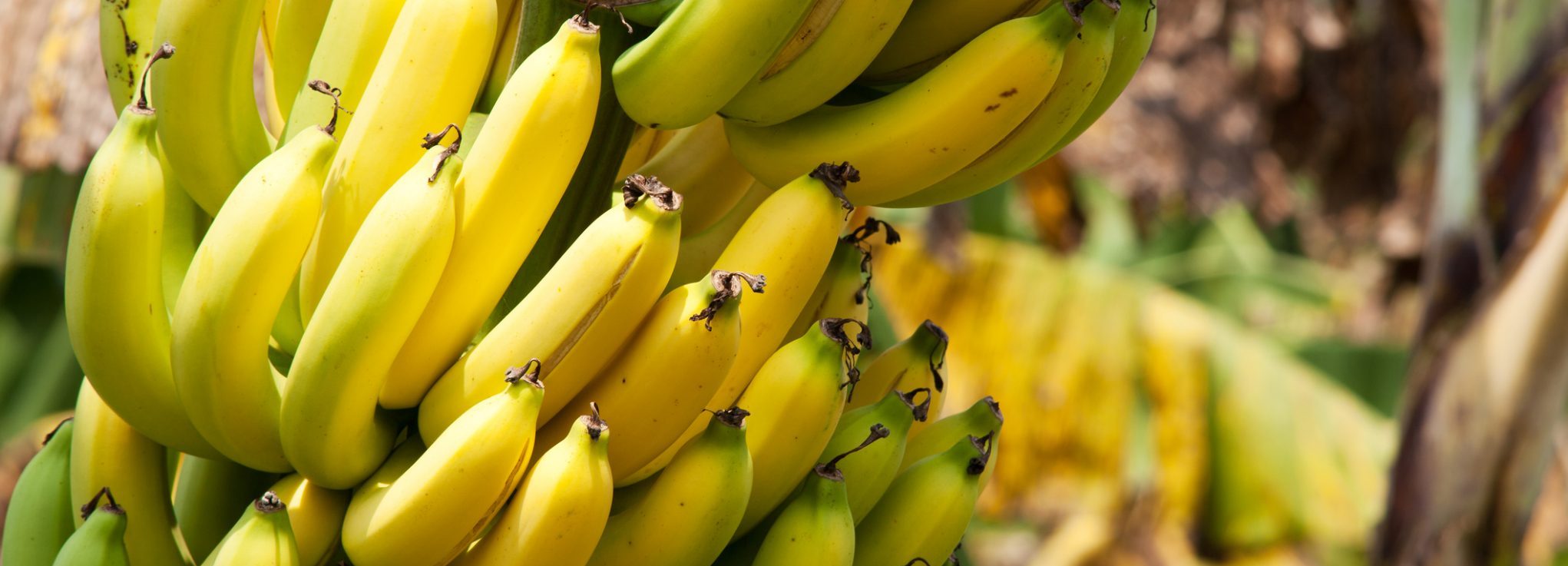
What is Fair Trade? By definition, Fair Trade aims to achieve fairness and transparency in international trade, and to combat worldwide poverty by securing the rights of marginalized producers and workers. That said, Fair Trade is more than just trading. It is a vision of business and trade that puts people and planet before profit, fights poverty, climate change, gender inequality and injustice, and is a proof of concept that showcases the enterprise models of the new economy. Kimberton Whole Foods’ mission is to support fair trade initiatives by selling products that meet or surpass fair trade standards.
“From poverty to climate change to struggles with health and safety, people all over the world face incredible challenges simply trying to earn a living. To compete in today’s market, businesses drive down prices at the expense of those most vulnerable: farmers, workers, fishermen, and craftsmen. Shopping Fair Trade means taking a stand for a system that treats everyone with respect.” -Word Fair Trade Organization
Which products can be Fair Trade Certified? Fair trade certification, at this time, is mostly given to crops such as coffee, chocolate, fruit, and cotton, which can be monitored at the farm level. Manufactured products, such as a cotton shirt, can be certified if all steps in production are certified. For more complex manufacturing, certification may not be possible. (But it doesn’t mean that they can’t be fairly, responsibly traded.) Producers may join a membership group for accountability in place of third party certification.
In the U.S. there are many different fair trade labels you may encounter when shopping, and it can be confusing! It is important to understand that there is not one single “Fair Trade” certifier. In addition to fair trade certifiers, there are fair trade membership groups and cooperatives which serve different purposes.
FAIR TRADE CERTIFIERS
These organizations rely on third-party independent certifiers and offer a trusted labeling system, so that consumers can clearly identify products that are fairly traded.
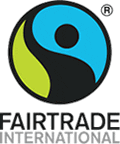 Fairtrade
Fairtrade
Fairtrade is the world’s largest and most recognized fair trade system, and consists of three producer networks: Fairtrade International, 32 Fairtrade organizations, and FLOCERT, the independent certification body for Fairtrade. Their mission as a global organization is “to secure a better deal for farmers and workers.” Most of their certified products are food items like coffee, tea, chocolate, and bananas.

Fair Trade America is an independent non-profit organization associated with the international Fairtrade system. They provide independent certification of the product supply chain through FLOCERT, assuring consumers that the certified product meets the internationally agreed Fairtrade Standards.
Fair Trade USA (Fair Trade Certified)
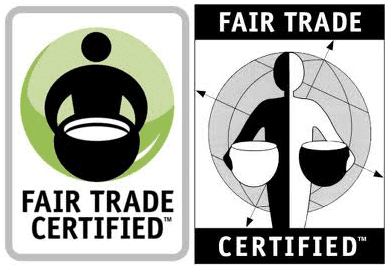
Fair Trade USA was founded in 1998 as an independent, nonprofit organization that sets standards, certifies, and labels products that are fairly traded. Find their Fair Trade Certified standards here. Their third-party independent certifier, SCS Global Se
rvices, issues licenses for the use of their Fair Trade Certified label. They certify a wide range of products including clothing, home goods, food, and beverages. The logo pictured on the left is the new version of their logo, while the one on the right is the old version – you may continue to see the old version as companies update their packaging.
Fair for Life
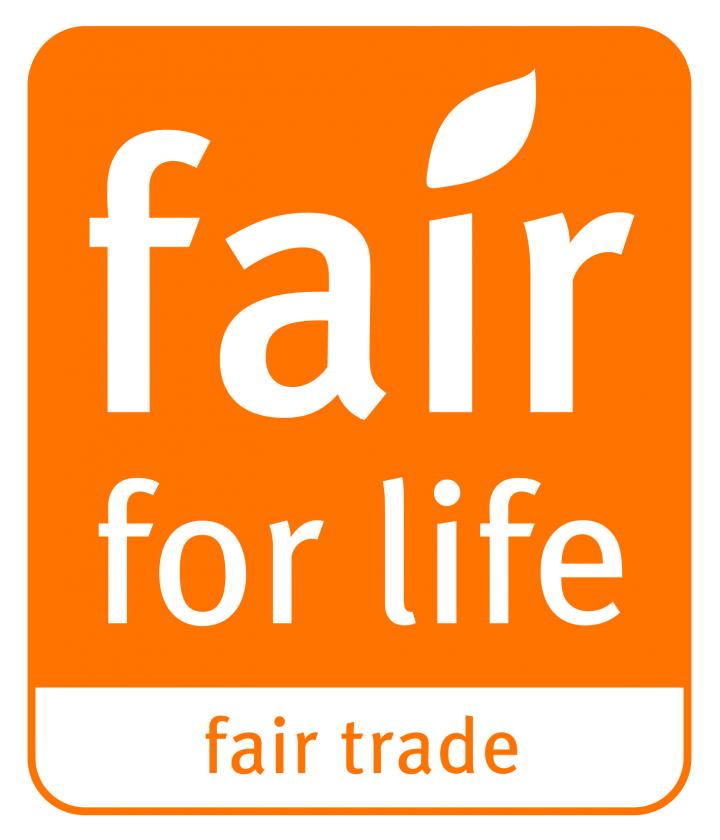
Fair for Life offers two certifications: Fair for Life (FFL) and For Life (FL). Both aim to respect human rights, fair working conditions, and ecosystems, and the promote sustainable agricultural practices. FFL is a product certification program for fair trade and responsible supply-chains. FL is a certification program for companies: When certified, this means that their entire supply-chain has been controlled according to the For Life standards. They use the third-party certifier, Institute for Marketecology (IMO) Fair for Life promotes transparency by publishing performance ratings of certified producers on their website.
FAIR TRADE MEMBERSHIP GROUPS
Membership groups connect organizations, farmers, producers, and suppliers, to work towards a fair trade system for all.
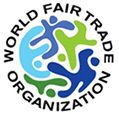
World Fair Trade Organization (WFTO)
The WFTO is a global network of organizations representing the Fair Trade supply chain. Membership offers credibility and the opportunity to “connect with like-minded people from around the world, tools and training to increase market access, and a common voice that speaks out for Fair Trade and trade justice.” The WFTO operates in over 70 countries across 5 regions through elected global and regional boards. Member organizations and retailers adhere to 10 Principles of Fair Trade.
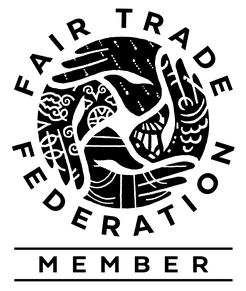
Fair Trade Federation (FTF)
The FTF is a trade association that focuses on North American organizations. As a member of the WFTO, their Fair Trade Principles are nearly identical.
FAIR TRADE CO-OPS
A worker cooperative is a for-profit structure based on democratic principles, in which each member has an equal vote.
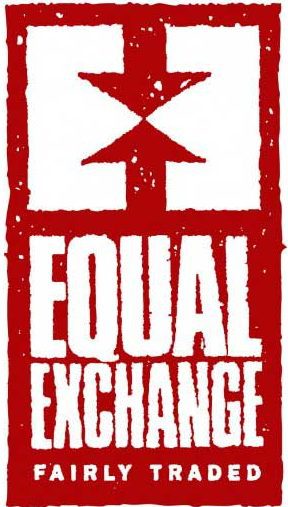
Equal Exchange
Equal Exchange was founded in 1986, and works with over 40 small farmer organizations in Africa, Asia, Latin America, and the United States. Its mission is to bring the Fair Trade model to U.S. grocery stores and to demonstrate the viability of Fair Trade to others in the industry. We proudly offer their fair trade bananas in our stores!
Look for these fairly traded products
Chocolate
For cocoa farmers, life isn’t easy. Crops are damaged by climate change and disease, and income is uncertain. The cocoa industry is filled with child labor. Buying fairly traded chocolate means ensuring that producers get a decent price and decent pay for their labor, and that no child labor was used in its production. Look for a wide assortment of delicious, fairly traded chocolate in our stores.
Bananas
The banana industry provides employment for thousands of people in developing countries in Latin America, the Caribbean, Southeast Asia, and West Africa. Social problems such as poor working conditions, low wages, and and unreliable employment plague the industry. For small farmers, growing bananas for a living can be unpredictable and unsustainable. Buying Fairtrade bananas means ensuring that producers get a decent price and decent pay for their labor, including the Fairtrade Premium, which is extra money producers can invest in business or community projects. You’ll ONLY find fairly traded, organic bananas at Kimberton Whole Foods.
Cotton
Cotton is vital for the survival of many low income countries in Central and West Asia and Africa. Cotton farmers in developing countries live in hardship. Government subsidies for cotton farmers in rich countries such as the United States lower the price of seed cotton to a rate at which small-scale farmers cannot compete. You’ll find a small selection of quality clothing made with Fair Trade cotton in our stores.
Coffee
The coffee market is notoriously unstable: global production varies greatly from year to year due to weather and disease, which leads to large fluctuations in price. For the small farmers that depend on this trade for their livelihood, which is estimated at around 125 million people, this can lead to great hardship. Buying fair trade coffee means that the farmers were paid enough to cover their costs of production and give them a safety net when market prices fall below a sustainable level. Look for fairly and responsibly traded coffee at your local Kimberton Whole Foods.
Other products to consider buying Fair Trade: cut flowers, sugar, tea, avocados, coconut oil, as well as handmade clothing, crafts, and goods.





